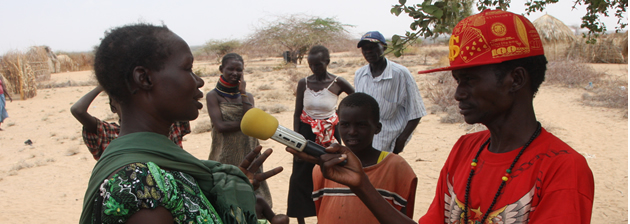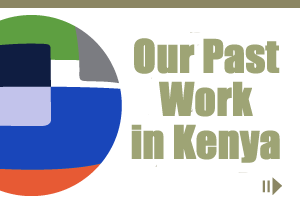By Wesley Lang’at
To work in radio is fascinating for Mike Emaniman a comedian and morning drive show presenter at Radio Akicha, a catholic owned radio. “I have never attended any journalism school but I have passion for radio,” Mike said after being trained by Internews in Kenya.
The training was timely since it helped Mike to better his journalism skills.
In a region that has for many years been entangled in natural resource conflict, insecurity, hunger and lack of quality drinking water, Internews in Kenya through Emerging Oil, Emerging Stories project organized a one week training workshop and field mentoring for Radio Akicha journalists. This was one of the ground breaking training on land and natural resources in Turkana.
The training aimed at empowering journalists with skills and knowledge on how to tell oil and other tales better using long form storytelling.
Since Oil discovery is a new venture in Turkana, many journalists here have little knowledge about the sector and its related impact on the economy.
However, Mary Tioko a station manager for Radio Akicha confirmed the need of having training:
“It has not been easy working in Radio Akicha especially with less trained journalists. These people must be trained in all aspects of journalism because most of them are form four leavers and hardly received any formal training”.
As you walk through Lodwar town, a morning drive show called “Akicha uniamshe”dominates the the air waves. And this is the voice of Mike Emaniman, a comedian nick named “maasai” commanding thousands of listeners in Turkana.
Training components involved basic journalistic skills, history, legislation, and economics of oil. This was a timely opportunity for someone like Maasai to exploit his potential. He believes that the training worked out magic for him. His community has been in endless cycles of water shortages for many years and he didn’t know how to help them. “I want to voice the concerns of my people. They don’t have water. They travel for long distance looking for water,” he said.
With headsets on his neck and a recorder, Mike set off to Lokaparpai village to file a radio feature on water shortages. This was a successful venture for him. When the story went on air many of his listeners called back. Now he not only entertains but also educates and informs his audience with new-found authority.
“We need to have this kind of training more often,” said David Omwoyo, a Managing Director at Waumini Communication.




